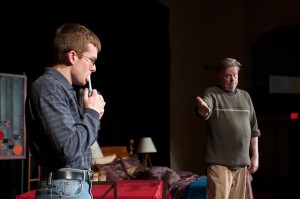The darkness that accompanies a scene change in a play forgives many sins. On stage, silhouettes break character and move, settings are rearranged, and costumes changed. In the audience, programs are consulted, stifled coughs are let free, and critics scribble furiously in low light, hoping their witticisms will be legible th e next morning. Every so often, however, the brief respite between scenes is a pregnant pause; we are on the edge of our seats, waiting to see what happens next without extraneous motion or chatter. This is the case with Wilbury’s superb rendering of Annie Baker’s Body Awareness, where each scene’s end is the promise of an even better scene to follow.
e next morning. Every so often, however, the brief respite between scenes is a pregnant pause; we are on the edge of our seats, waiting to see what happens next without extraneous motion or chatter. This is the case with Wilbury’s superb rendering of Annie Baker’s Body Awareness, where each scene’s end is the promise of an even better scene to follow.
To call this production “delightful” is to perhaps render it a disservice, for that word fails to convey much of the gravity bubbling underneath what, on its surface, is a humorous glimpse at a modern family’s struggle with love, sex, and child rearing. The plot is fairly straightforward: Joyce and Phyllis share a domestic partnership and live with Joyce’s adult son, Jared, who shows increasing signs of Asperger’s. A photographer, Frank, comes to town (the fictional Shirley, Vermont) as one of the visiting artists participating in “Body Awareness Week” at Shirley State, curated and hosted by Phyllis. Frank’s presence shakes up the household and causes all to question their relationships to each other and themselves. Questions of sex and sexuality, political correctness, and societal expectation follow. Heady stuff, but in the hands of director Wendy Overly and a monumentally facile cast, also supremely amusing.
Of course, the etymology of “facile,” like “delightful,” highlights several meanings of those words, some of which have surprising connotations. Body Awareness, as much as anything, is about the meanings behind our communication and how that reflects our self-image and the way we perceive others. Jared (played with an expertly judicious blend of comedic timing and pathos by Samuel Appleman), is a 21 year old living at home with Mom and her lover and takes solace in the dictionary since communication with actual people tends not to work out so well. He chooses to label others as “imbeciles,” which he explains once meant “weak and stupid” as a way to shield himself from suspicions of his own frailties. His relationship with his mother, Joyce (a knockout performance by Clare Blackmer), is complex but loving and although Phyllis (a star turn by Karen Carpenter , particularly in her final monologue) is more objective about her assertions that Jared needs professional care, she is ultimately protective of him as well.
The family dynamic is shaken as Frank Bonitatibus (one of the best surnames ever, the origin of which translates roughly to “kindness, benevolence, and/or blamelessness”) comes to stay with them. His photography, it seems, is suspicious in that it only entails nude females. Frank’s answers to direct challenges toward his intentions boils down to, “If Michelangelo masturbated to the Sistine Chapel, would it make the work any less profound?” Kerry Callery portrays Frank with quiet, yet towering strength. Callery conveys more with a silent stare and the blinking of his eyes than entire monologues can. His own humorous moments are understated, such as his insistence on a Tuesday evening Shabbos to bring meaning to the family dinner (one of many moments when pounds of uneaten food get served and then cleared away) and he delivers one of the few wild recorder solos you’ll see this side of a Waldorf school. Frank brings a new awakening to Joyce and Jared, and the other meanings of “delight” – pleasure and sexual desire – come to the forefront with mixed results.
The production has been mounted in the original home of Trinity Rep at the Southside Cultural Center on Broad Street in Providence. There is a whiff of history in the aged space and, while somewhat bare, the hall has been imbued with just enough production value by the artistic team to enhance rather than obscure the lean surroundings. I strongly recommend sitting center or house right as many of those perfect, silent moments can be lost on those seated toward the left of the audience. Those moments speak volumes in a production that is awash in poignantly hilarious sound and language. The buzz of an electric toothbrush elicits laughter without a word being said, but it is the silence that speaks loudest. In the end, we are ultimately pleased, charmed and confronted with questions of self and sexuality that are awkward yet highly comical and often comforting. Delightful, indeed.
More Posts by The Author:
Miss You Like Hell: Erin McKeown discusses her RI premiere
Base Instincts: Burbage’s Edward II turns Marlowe on its head
Admission Is Free, but Guilt Costs Everything: The Gamm delivers another biting look at who we think we are
Magic, Music and Merriment: Wilbury kicks the year off with a Rhody premiere
GAMM’s Wonderful Life Is Simply Charming



